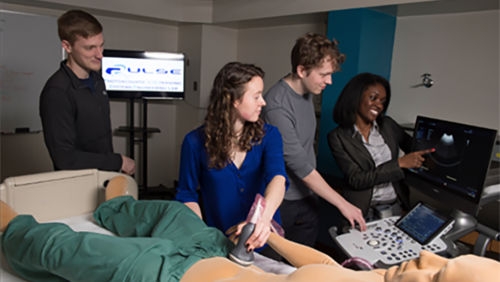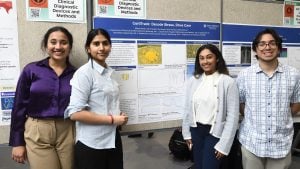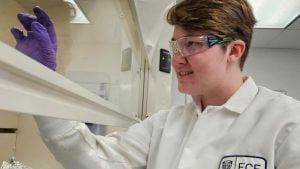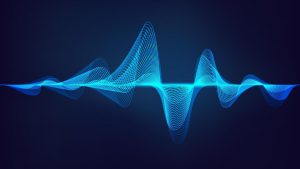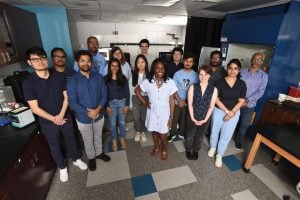Johns Hopkins graduate program in Electrical and Computer Engineering, ranked No. 18 in the nation by U.S. News & World Report in 2025, offers a rigorous educational experience, opportunities to conduct research with renowned faculty, and outstanding mentorship and professional preparation.
| Application deadlines | October 1 for spring 2026 admission February 15 for fall 2026 admission |
| Average time to degree completion | Four full-time semesters |
| Tuition | $66,670 annually / $33,335 per semester More details |
| Funding support | More details here |
No GRE required, and no application fee.
What makes us unique?
-

A top-ranked program, a top-ranked school
Our Computer Engineering program is ranked No. 17, the Electrical Engineering program is ranked number No. 18, and Hopkins Engineering is No. 13 overall in U.S. News & World Report’s 2025 – 2026 graduate program rankings.
-

The Master's Scholars program
Exceptional students will be considered for a summer internship with the Johns Hopkins Applied Physics Laboratory.
-

Draw upon our expertise in human language technology
In affiliation with our internationally known Center for Language and Speech Processing, we offer a thesis-based master’s concentration in Human Language Technology.
About our program
Multiple academic pathways
Depending on your interests and goals, you can choose an academic (course-only) track or a research (essay-based) track.
Tailor your studies to suit your interests and career goals
Acquire in-depth knowledge in areas relevant to your professional goals in the following concentration areas:
- Artificial Intelligence and Data Science
- Language and Speech Processing
- Photonics and Optoelectronics
- Computer Engineering and Microelectronics
- Image Processing and Analysis
- Control Systems
- Sustainable Energy
The Hopkins network
Join us and you’ll be part of a worldwide network of alumni who are committed to your professional success.
Access to the full resources of Johns Hopkins University
As a graduate student, you will have opportunities to collaborate with researchers at Johns Hopkins acclaimed School of Medicine, scholars who are leading discoveries in geriatrics engineering, and more.
Bisi Bell: Sharper, safer, more inclusive medical imaging
Muyinatu 'Bisi' Bell's innovative work is enhancing diagnostic accuracy, improving surgical precision, and ensuring equitable health care for all patients
Outcomes-oriented
Our graduates are leaders in industry and entrepreneurs, working at the forefront of fields from renewable energy, robotics, and government to medicine and technology.
The job outlook for professionals in electrical and computer engineering, data, science, AI, and machine learning is excellent. According to the Bureau and Labor and Statistics, in 2024, the average salary for a machine learning engineer was $138,000, and $112,000 for an electrical engineer.
| Select Employers | ||||||
|
The ECE MSE student experience
Research
Learn about our areas of research and associated research centers and institutes Learn moreLearn about program requirements
We offer three master’s tracks—academic (course-based), research (essay-based), and a Human Language Technology master’s concentration.
All options provide students with an intensive exposure to advanced topics in electrical and computer engineering and strengthen understanding of engineering fundamentals.
Students completing an “all-course” degree will successfully complete a coordinated sequence of 10 courses totaling 30 credits or more, which typically requires three to four semesters of study.
View all ECE master’s program requirements
Students who elect the research option complete a coordinated sequence of eight courses and graduate research and submit a master’s essay (thesis). These total 30 credits or more.
To learn more about the MSE research option, contact email
View all ECE master’s program requirements
Master’s students in both Electrical and Computer Engineering and Computer Science can choose the Human Language Technolgy concentration, a program designed to prepare students for careers in industry
Students in the HLT concentration must fulfill their degree program requirements, complete a master’s project/thesis related to human language technology, and take the following courses:
- Introduction to Human Language Technology (601.667)
- Natural Language Processing (601.665)
- Information Extraction from Speech and Text (520.666)
View all Human Language Technolgy Master’s Level requirements
Imagine yourself here
Baltimore has so much to offer. From vibrant and diverse neighborhoods with affordable housing, a farmers' market, excellent restaurants and the Baltimore Museum of Art just blocks from campus to professional sports teams, a rich history and a lively culture scene, make Baltimore a great place to call home.
Ready to apply?
Get the information you need about our application process and financial aid, or get your application started today!
Only at Johns Hopkins

Making AI Video Generators Smarter About Physics - New system keeps videos from defying gravity and breaking the laws of reality.
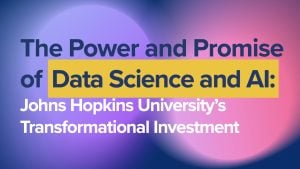
A transformational investment in data science and AI - We are building a national epicenter for research and education focused on emerging applications, opportunities, and challenges presented by data science, machine learning, and AI, including materials engineering.
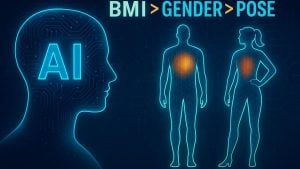
Does AI have a weight problem? - New research shows body recognition systems rely heavily on BMI, raising questions about accuracy.
